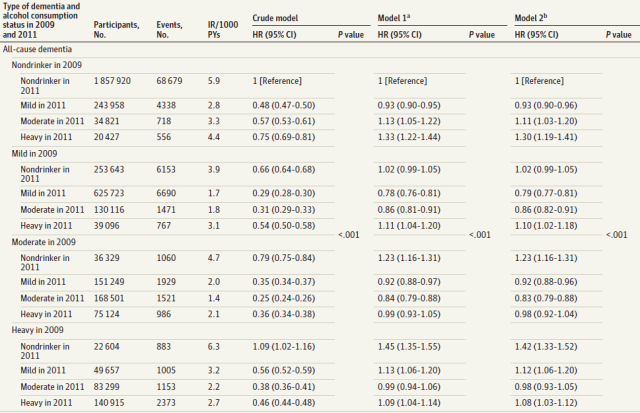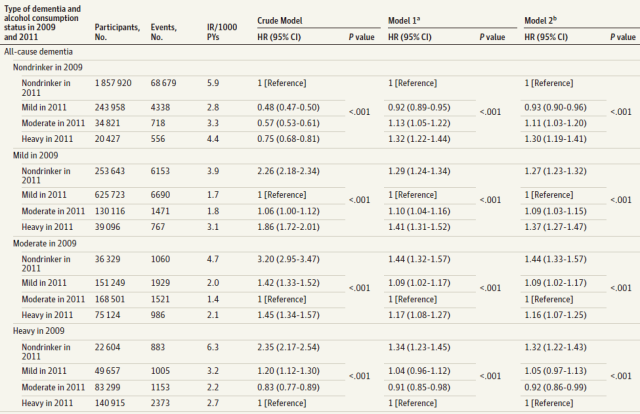Light Alcohol Drinking Linked to Lower Risk of Dementia
- WHO Releases Global Influenza Vaccine Market Study in 2024
- HIV Infections Linked to Unlicensed Spa’s Vampire Facial Treatments
- A Single US$2.15-Million Injection to Block 90% of Cancer Cell Formation
- WIV: Prevention of New Disease X and Investigation of the Origin of COVID-19
- Why Botulinum Toxin Reigns as One of the Deadliest Poisons?
- FDA Approves Pfizer’s One-Time Gene Therapy for Hemophilia B: $3.5 Million per Dose
Light Alcohol Drinking Linked to Lower Risk of Dementia
- Red Yeast Rice Scare Grips Japan: Over 114 Hospitalized and 5 Deaths
- Long COVID Brain Fog: Blood-Brain Barrier Damage and Persistent Inflammation
- FDA has mandated a top-level black box warning for all marketed CAR-T therapies
- Can people with high blood pressure eat peanuts?
- What is the difference between dopamine and dobutamine?
- How long can the patient live after heart stent surgery?
Light Alcohol Drinking Linked to Lower Risk of Dementia, Large-Scale Study in Jama Network Open.
Dementia is a global health problem with high economic and social burden.
There are approximately 57.4 million cases of dementia worldwide and this number is expected to increase to 152 million by 2050.
Despite the efforts of the scientific community, there are currently no highly effective treatment options to prevent or cure the disease.
It is well known that drinking alcohol is harmful to health, and drinking alcohol can increase the risk of cancer, heart disease, and high blood pressure. Alcohol use is generally recognized as a potentially modifiable risk factor for dementia, but results in the literature have been inconsistent.
On February 6, 2023, a research paper titled: Changes in Alcohol Consumption and Risk of Dementia in a Nationwide Cohort in South Korea was published in JAMA Network Open , a sub-journal of JAMA .
The large-scale analysis of nearly 4 million people found that light alcohol consumption was associated with a lower risk of all-cause dementia .
Compared with nondrinkers, light drinkers had a 21 percent lower risk of dementia, and moderate drinkers had a 17 percent lower risk of dementia. But higher alcohol consumption was associated with an increased risk of dementia, with heavy drinkers having an 8 percent increased risk of dementia.

In the study, the researchers analyzed the Korean National Health Information System ( NHIS ) database, which included 3,933,382 participants, with an average age of 55 years and 51.8% male.
None were dementia-free at the start of the study. Adults aged 40 and over received two health checkups in 2009 and 2011, including the number of days and amount of alcohol consumption per week.
According to the amount of drinking, the participants were divided into: no drinking , light drinking (corresponding to <15 grams of alcohol per day, equivalent to a can of 350ml beer) , moderate drinking (corresponding to 15-30 grams of alcohol per day) and heavy drinking (corresponding to over 30 grams) .
Based on changes in drinking levels from 2009 to 2011, participants were categorized as: no drinkers, abstainers, decrease drinkers, maintain drinkers, and increase drinkers .
The researchers analyzed the association of composite patterns of alcohol consumption with the incidence of all-cause dementia, Alzheimer’s disease (AD), and vascular dementia (VaD) .
At the first health check, 54.8% of the participants had never drank alcohol, 26.7% were light drinkers, 11% were moderate drinkers, and 7.5% were heavy drinkers.
From 2009 to 2011, 24.2% of light drinkers, 8.4% of moderate drinkers, and 7.6% of heavy drinkers abstained from alcohol, however, 13.9% of never drinkers and 16.1% of light drinkers And 17.4% of moderate drinkers increased their drinking levels.
During a mean follow-up period of 6.3 years, 100,282 cases of all-cause dementia, 79,982 cases of Alzheimer’s disease, and 11,085 cases of vascular dementia were documented.
Moderate alcohol consumption is associated with a lower risk of all-cause dementia, study finds.
Compared with never drinkers, light drinkers had a 21 percent lower risk of all-cause dementia, moderate drinkers had a 17 percent lower risk of dementia, and heavy drinkers had an 8 percent higher risk of dementia .
Similar results were observed in Alzheimer’s disease and vascular dementia.

Alcohol consumption and risk of dementia
An analysis of changes in alcohol consumption found that reducing alcohol consumption from heavy to moderate, and starting from no alcohol consumption to light alcohol consumption, was associated with a lower risk of all-cause dementia compared with people who maintained the same amount of alcohol consumption.
People who abstained from alcohol and those who increased their drinking showed a higher risk of all-cause dementia .

Changes in alcohol intake linked to dementia
The researchers suggest that the protective effects of moderate alcohol consumption may be due to multiple mechanisms.
For example, in AD, previous studies have suggested that the protective effects of light to moderate alcohol consumption involve reducing neuroinflammation.
With regard to VaD, previous studies have suggested that light to moderate alcohol consumption may have beneficial effects on the vasculature, with beneficial effects on platelet function and elevated serum concentrations of high-density lipoproteins.
However, excessive alcohol consumption produces various deleterious effects through direct mechanisms, such as the proven neurotoxic effects of alcohol and nutritional deficiencies, and also exacerbates AD pathology by enhancing tau protein accumulation.
The harms of alcohol outweigh any small benefits , the research team noted . Early research shows that drinking alcohol increases the risk of cancer, heart disease, high blood pressure and weakens the immune system.
The researchers also raised limitations in that the study could not conclusively prove that alcohol, rather than other factors such as diet or genetics, was responsible for the reduced risk of dementia.
For example, alcohol consumption was self-reported by participants and may not be accurate, and participants who did not drink alcohol tended to be older, which may increase their risk of developing dementia from other causes.
It’s worth mentioning that while this research is interesting and deserves further study, alcohol consumption should not be used by anyone as a way to reduce their risk of Alzheimer’s disease or other dementias.
Paper link :
https://jamanetwork.com/journals/jamanetworkopen/fullarticle/2800994
Light Alcohol Drinking Linked to Lower Risk of Dementia
(source:internet, reference only)
Disclaimer of medicaltrend.org
Important Note: The information provided is for informational purposes only and should not be considered as medical advice.



